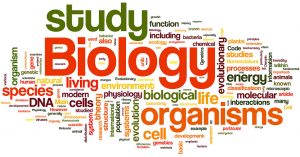A-LEVEL BIOLOGY
‘Biology . . . . . is for life’
A Level – Biology

Introduction
The A’ Level specification offers students an opportunity to gain a sound understanding of Biology and to explore modern applications of Biology – e.g. antibiotic resistance, epigenetics and gene technology. It allows students to develop skills such as analysis, evaluation, problem solving, research and an ability to understand complex processes, along with practical skills such as using a microscope, fieldwork and handling apparatus. It will provide an appropriate foundation for the study of Biology or related subjects in higher education and provide a worthwhile course in terms of general education and lifelong learning.

Subject Content
AS
Unit 1: Molecules and Cells
Unit 2: Organisms and Biodiversity
Unit 3: Practical Skills in AS Biology
A2
Unit 1: Physiology, Co-ordination and Control and Ecosystems
Unit 2: Biochemistry, Genetics and Evolutionary Trends
Unit 3: Practical Skills in Biology
Method of Assessment
Assessment of AS: External written examinations (1hour and 30 minutes) for both Units 1 and 2. Each exam consists of 6-8 structured questions and an essay and is worth 37.5% of the final AS. Unit 3 is an external written examination (1 hour) assessing practical skills and an internal practical assessment (marked by teachers and moderated by CCEA) Unit 3 is worth 25% of the final AS award. AS will contribute to 40% of the overall A level Award (AS1 – 15%, AS2 – 15% and AS3 10%)
Assessment of A2: External written examinations for Units 1 and 2 (2 hours and 15 minutes each), both consists of 6-9 structured questions and an essay. Unit 1 and 2 are worth 24% each. Unit 3 is an external written examination (1 hour and 15 minutes) assessing practical skills and an internal practical assessment (marked by teachers and moderated by CCEA) Unit 3 is worth 12% of the final A Level award.

Recommended GCSE Subjects and Grades
Double Award Science A*A*-AB
GCSE Biology A/B
Other Contributory Subjects
Chemistry (GCSE) A/B
Career Possibilities
Biology will provide opportunities for careers such as:
Agriculture Biochemistry Biomedical Science Biotechnology
Dentistry Dietetics Food Science Food Technology Medicine
Nursing Pharmacy Physiotherapy Psychology Veterinary Science